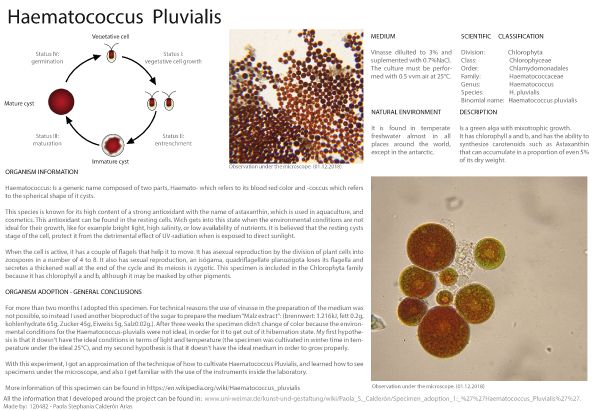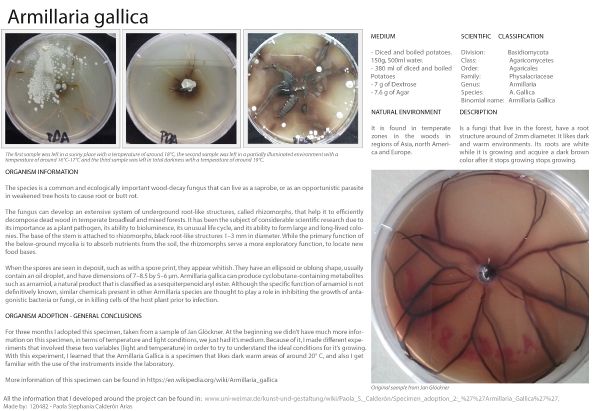No edit summary |
No edit summary |
||
| (9 intermediate revisions by the same user not shown) | |||
| Line 2: | Line 2: | ||
*Architect ''(2012)'' and Designer with an emphasis in product design ''(2013)'' of Los Andes University (Bogotá/Colombia) | *Architect ''(2012)'' and Designer with an emphasis in product design ''(2013)'' of Los Andes University (Bogotá/Colombia) | ||
*Currently making Master in Media Architecture in Bauhaus University (Weimar/Germany) | *Currently making Master in Media Architecture in Bauhaus University (Weimar/Germany) ''(2018-2020)'' | ||
| Line 10: | Line 10: | ||
''' | '''LINKS TO ORGANISM ADOPTION''' | ||
[[File:DATA sheet Physarum Polycephalum.jpg|600px]] | |||
[[/Project: Specimen ''Physarum Polycephalum''.]] | |||
Is a protist known as the “many-headed slime”. It has a characteristic strong yellow color. It uses cytoplasmic streaming to search for food, the logic behind this specimen’s movement is still a subject of study for biologist and scientists. | |||
[[ | [[File:DATA sheet Haematoccocus Pluvialis.jpg|600px]] | ||
[[/Specimen adoption 1: ''Haematococcus Pluvialis''.]] | [[/Specimen adoption 1: ''Haematococcus Pluvialis''.]] | ||
Is a green alga with mixotrophic growth. It has chlorophyll a and b and has the ability to synthesize carotenoids such as Astaxanthin that can accumulate in a proportion of even 5% of its dry weight. | |||
[[File:DATA sheet Armillaria Gallica.jpg|600px]] | |||
[[/Specimen adoption 2: ''Armillaria Gallica''.]] | [[/Specimen adoption 2: ''Armillaria Gallica''.]] | ||
Is a fungi that live in the forest, have a root structure around of 2mm diameter. It likes dark and warm environments. Its roots are white while it is growing and acquire a dark brown color after it stops growing. | |||
'''LINKS WORKSHOP AND PREVIOUS INVESTIGATION''' | |||
[[/PREVIOUS-INVESTIGATION.]] | |||
In order to decide which microorganism are suitable for the work that is going to be developed, an initial investigation is made in order to understand the characteristics of each microorganism, their needs in order to grow, and important information suitable for the project. | |||
[[/WORKSHOP]] | |||
During the three first days, a series of activities were made, and are described in the link. | |||
Latest revision as of 08:15, 28 March 2019
BACKGROUND.
- Architect (2012) and Designer with an emphasis in product design (2013) of Los Andes University (Bogotá/Colombia)
- Currently making Master in Media Architecture in Bauhaus University (Weimar/Germany) (2018-2020)
PERSONAL REASONS TO ATTENDING THE COURSE
As an architect and a product designer, the scale with I interact in my everyday life is a macro scale, that is based in KM for urbanistic projects, M for building, CM and MM for product design. The scale of the microbiology world is something that I have always find fascinating, but sadly since the school, I haven't had the opportunity to interact with it. This course offers me the opportunity to reconnect with this world, to learn from it, experiment and the opportunity to see it through different lenses. I hope that at the end of this course I will be able to understand what experimental microbiology is and see if this subject has a connection to my previous knowledge.
LINKS TO ORGANISM ADOPTION
/Project: Specimen Physarum Polycephalum. Is a protist known as the “many-headed slime”. It has a characteristic strong yellow color. It uses cytoplasmic streaming to search for food, the logic behind this specimen’s movement is still a subject of study for biologist and scientists.
/Specimen adoption 1: Haematococcus Pluvialis. Is a green alga with mixotrophic growth. It has chlorophyll a and b and has the ability to synthesize carotenoids such as Astaxanthin that can accumulate in a proportion of even 5% of its dry weight.
/Specimen adoption 2: Armillaria Gallica. Is a fungi that live in the forest, have a root structure around of 2mm diameter. It likes dark and warm environments. Its roots are white while it is growing and acquire a dark brown color after it stops growing.
LINKS WORKSHOP AND PREVIOUS INVESTIGATION
/PREVIOUS-INVESTIGATION. In order to decide which microorganism are suitable for the work that is going to be developed, an initial investigation is made in order to understand the characteristics of each microorganism, their needs in order to grow, and important information suitable for the project.
/WORKSHOP During the three first days, a series of activities were made, and are described in the link.


